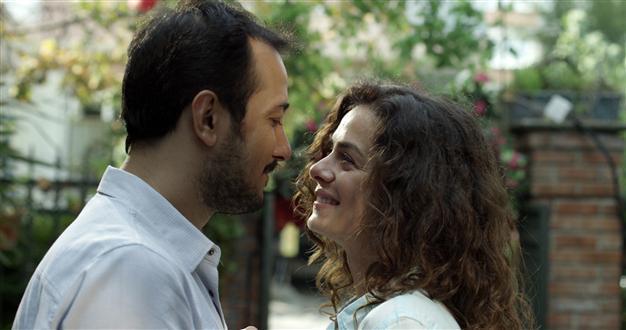Journey into Turkey’s recent history with two soundtracks
Emrah Güler

'MIXTAPE'
The soundtracks to two recent Turkish releases could offer the best opportunity to glimpse Turkey’s last three decades – into what we have listened to in love, loss and in the mood to dance. Both director Çiğdem Vitrinel’s sophomore feature “Fakat Müzeyyen Bu Derin Bir Tutku” (But Müzeyyen, That’s the Deepest Desire) and Tunç Şahin’s “Karışık Kaset” (Mixtape) take their viewers into their stories of love through their music.Both films are adaptations, and both offer the triple pleasure of the written word, movie going experience and a nostalgic trip through music. “Fakat Müzeyyen” is a loose adaptation of İlhami Algör’s novella of the same name. In fact, the exact phrasing in the film credits is “inspired by.” The film stars two TV favorites, Erdal Beşikçioğlu and Sezin Akbaşoğulları.

The film takes on the relationship dilemma through the eyes of a handful of male and female characters. One of the characters, Barış, is played by Harun Tekin, the lead vocalist and guitarist of the famous alternative rock band Mor ve Ötesi. Tekin takes on the film score and the production of the soundtrack, a nostalgic journey into the 2000s, with a few surprises from recent history. Bands and singers like Vega, Replikas, Gece, Aylin Aslım and Koray Candemir lend their popular hits to “Fakat Müzeyyen”s soundtrack, taking the Turkish audience to a decade back.
Mixtape for a romantic comedy
“The Chapul Song,” sang in English, is one of the many songs inspired by last year’s mass protests. The word chapul is a reference to the self-appointed title of the resisters in Turkey following the then-Prime Minister Recep Tayyip Erdoğan’s use of the term “çapulcu,” looters, for the protestors. The soundtrack, which includes a surprise duet with Koray Candemir and the leading actress Akbaşoğulları, is available on iTunes.
As evident from its title, Uygar Şirin’s novel “Karışık Kaset” was an ode to music and the love of music. The book was also an ode to the healing power of music in matters of the heart. The film adaptation stays mostly true to the book and its use of music throughout its pages. Sarp Apak and Özge Özpirinçci play Ulaş and İrem, the star-struck lovers whose story unfolds in three acts, and in three decades.
An integral part of the book in defining life through the first-person account of Ulaş, music takes its part in the film, as well. Ulaş preparing mixed tapes is a central part of the story, the songs serving both as a tool of self-expression for the protagonist and a wonderful background to this romantic comedy.
The songs are mostly from the 1990s, corresponding to the early teens of both of the characters, a soundtrack to the first act, Ulaş’s coming-of-age. The film features songs from the famous period’s individuals like, Tarkan, Mirkelam and Özlem Tekin, as well as lesser-known songs from giants like Sezen Aksu, MFÖ and Erkin Koray. You can listen to the songs on the flim’s Spotify page and delve further into some of the songs mentioned in the book at writer Şirin’s blog.
From Greek music to the underbellies of Istanbul
Director Çağan
Irmak is a blessed filmmaker in that both audiences and critics are
generally fond of his body of work.
The soundtracks to two of his films
feature a collaboration with a Greek composer, Evanthia Reboutsika. The
coming together of the two is not unlike a film scene, with Irmak hearing the
music that Reboutsika composed for a Greek production while he was on
his boat harbored off of the Aegean coast, the music coming from her
neighboring boat.
Reboutsika wrote the score for both Irmak’s
2005 magnum opus, “Babam ve Oğlum” (My Father and My Son), a drama set in
the aftermath of the 1980 military coup, and 2008’s “Ulak” (The
Messenger), a hard-to-watch, mystical and mythological tale.
One
of the most popular films of the 1990s, director Mustafa Altıoklar’s
adaptation of Metin Kaçan’s novel “Ağır Roman” (Cholera Street) also has
a killer soundtrack that continues to stay relevant and inspire. The
film is set in the underbellies of Istanbul, a crime-ridden neighborhood
with local mafia, Greek prostitutes, and their pimps as its major
characters.
The soundtrack is written and produced by veteran
Attila Özdemiroğlu, with songs capturing the grim atmosphere through
blending Roma tunes, Turkish “arabesk” music, and a few classic songs
thrown in. The late writer of many of the classic songs in Turkey in the
last half-a-century, Aysel Gürel, both has a supporting role and lends
some heart-wrenching lyrics to some of the songs in the soundtrack.
















